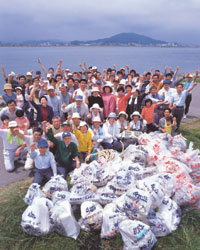メニュー
Adoption Program
The Yoshino River Council, which is a nonprofit organization consisting of businesses, groups and public entities, tries to enhance the attractiveness of Yoshino River.

“Adoption Program” Spreads All Over Japan
The “Adoption Program”consists of citizens' groups and businesses that, in cooperation with local government, adopt areas of public land in their community for the purpose of its beautification.
This scheme has its roots in the “Adopt-A-Highway Program”, which began in 1985 in the American state of Texas. Here, out of concern for the local environment, volunteers adopted stretches of highway to clean. This program was a great success and it eventually spread to all 48 American states and also to other countries. In Japan, the spirit of this initiative was recognised by a citizens group from the township of Kamiyama, in the mountains of Tokushima Prefecture. The efforts of this group brought about the formation of the "Yoshino River Adoption Program" in 1999, which sought to beautify and preserve the local Yoshino River by having volunteers adopt stretches of the river to clean and maintain. The popularity of the Tokushima scheme soon spread to many other regions in Japan. The “Yoshino River Adoption Program” has become a “living classroom” for children to learn about environmental issues and the importance of nature, while providing the strength and cooperation needed to protect our precious water resources.

“Adoption Program” Spreads All Over Japan
The “Adoption Program”consists of citizens' groups and businesses that, in cooperation with local government, adopt areas of public land in their community for the purpose of its beautification.
This scheme has its roots in the “Adopt-A-Highway Program”, which began in 1985 in the American state of Texas. Here, out of concern for the local environment, volunteers adopted stretches of highway to clean. This program was a great success and it eventually spread to all 48 American states and also to other countries. In Japan, the spirit of this initiative was recognised by a citizens group from the township of Kamiyama, in the mountains of Tokushima Prefecture. The efforts of this group brought about the formation of the "Yoshino River Adoption Program" in 1999, which sought to beautify and preserve the local Yoshino River by having volunteers adopt stretches of the river to clean and maintain. The popularity of the Tokushima scheme soon spread to many other regions in Japan. The “Yoshino River Adoption Program” has become a “living classroom” for children to learn about environmental issues and the importance of nature, while providing the strength and cooperation needed to protect our precious water resources.
-
 Implementing the Yoshino River Adoption Program
Implementing the Yoshino River Adoption Program
1. The Yoshino River has been divided into areas approximately 600 meters in length, and these areas have been adopted by local businesses and community groups.
2. Each business or community group is charged with the task of cleaning their area of the river at least three times a year.
3. As a reward for this activity, local councils have erected signboards displaying the name of the business or community group along the banks of their adopted stretch of river.
4. The Yoshino River is kept clean.
-
 By promoting this program throughout the prefecture, we hope to bring citizens' groups, businesses and the public sector into closer cooperation with one another. Furthermore, given the current economic climate, it is hoped that this type of volunteer program will help reduce public expenditure.
By promoting this program throughout the prefecture, we hope to bring citizens' groups, businesses and the public sector into closer cooperation with one another. Furthermore, given the current economic climate, it is hoped that this type of volunteer program will help reduce public expenditure.
The “adoption” initiative continues to expand throughout Japan, while we in Tokushima also aim to expand the scope of our current program. In addition to the Yoshino River, it is also hoped that roads, parks, and coastline currently administered by Tokushima Prefecture can also be incorporated into the scheme.